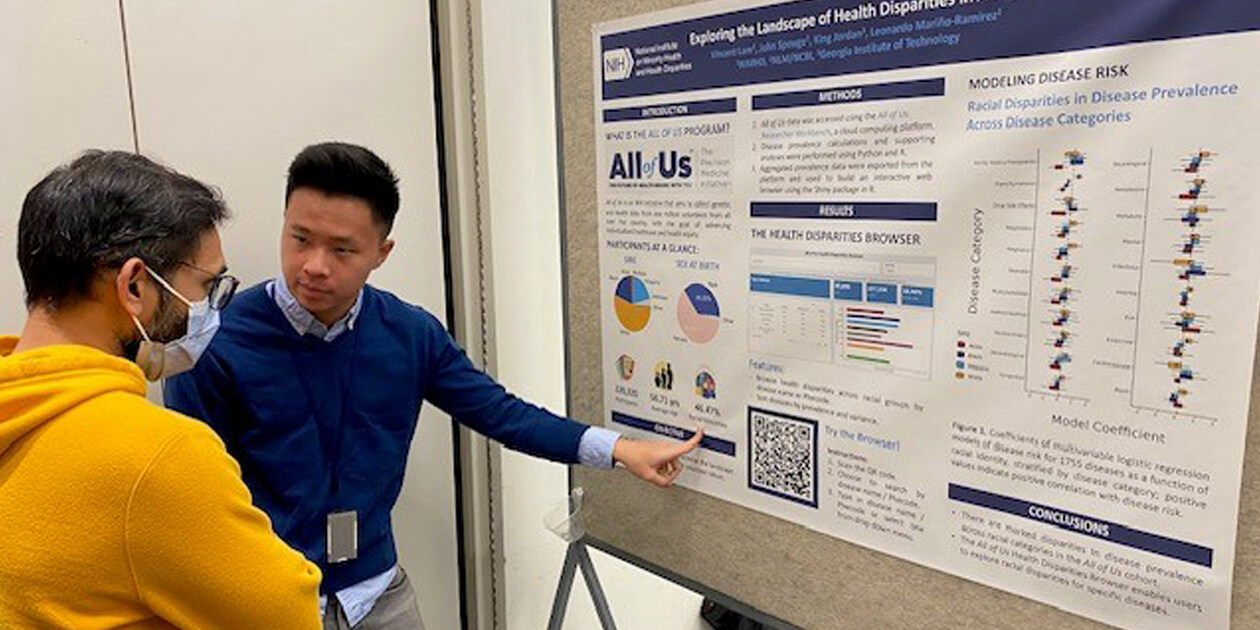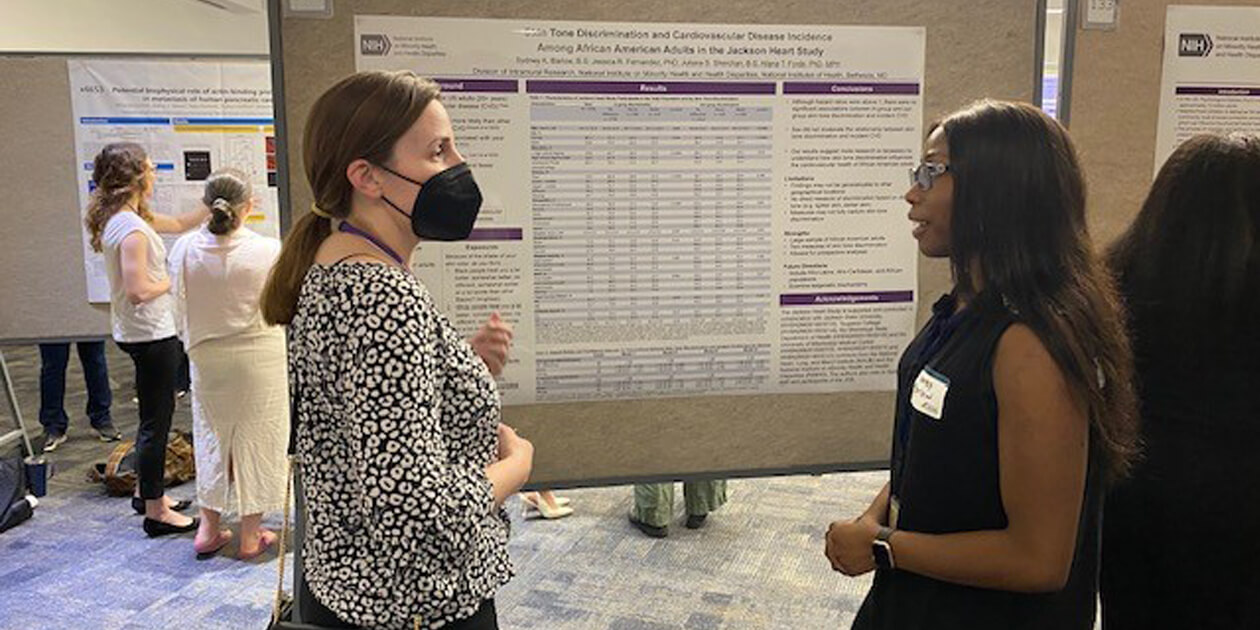
When his lab work at Cornell University was suspended and a summer internship he lined up fell through because of the COVID-19 pandemic, NIMHD Postbaccalaureate (Postbac) Intramural Research Training Award Fellow Vincent Lam (Cornell, ‘22) had a dilemma: How could he continue developing as a research assistant when wet labs and onsite classes were shutting down?
Since much of the research continuing at the time was computational, his solution: teach himself how to code.
Having taken no coding classes, with zero coding skills, and not even knowing if he was looking at the right coding methods, Lam, a recent biological sciences graduate from Cornell University, got to work in his Bayonne, New Jersey bedroom browsing scientific papers, books, and online forums to learn Python and R, two programming languages used to analyze and visualize scientific data.
Courses made free during the pandemic were a bonus.
“It wasn’t as though I had a bioinformaticist or computational biologist* on standby to answer my questions,” Lam explained. “I walked myself through the basics and eventually tried applying what I was learning on real biological datasets I could find online.”
He recalls finding a study focusing on proteins in animal models, trying to replicate the researchers’ results, and nailing it.
It took about a week.
Noticing Lam’s ingenuity, a lab at Rutgers University brought him on as a research assistant, where he co-authored his first peer-reviewed paper. Next, he joined a lab at Harvard University, and then NIMHD for a postbac fellowship.
Lam did have a bioinformaticist on standby when he joined Dr. Leonardo Mariño-Ramírez’s research lab at NIMHD. Dr. Mariño-Ramírez analyzes the role of genes in diseases and his mentorship made it possible for Lam to develop the U.S. Health Disparities Browser, a data visualization tool that allows users to see prevalence estimates for almost 2,000 diseases across self-identified racial and ethnic groups for more than 200,000 participants from NIH’s All of Us Research Program.
“What’s significant about Vincent’s research is that it exemplifies the power and utility of visualization in the era of big data,” Dr. Mariño-Ramírez said. “Vincent has created a visually intuitive and easy-to-use tool, which synthesizes this massive amount of data in a way that empowers researchers and citizen scientists to explore the landscape of health disparities in our country.”
Lam is recognized as an Outstanding Poster Awardee at NIH’s 2023 Postbac Poster Day. His presentation and poster, entitled, “Exploring the Landscape of Health Disparities in the All of Us Program,” scored in the top 20% of the 993 trainees who presented in person and virtually.
A delegation of graduate students, fellows, staff scientists, and clinicians judged trainees’ research methodology, poster layout, and ability to discuss their research within the larger context of reducing health disparities and improving minority health.
Connecting identity and purpose

For NIMHD postbac fellow Sydney Barlow (Carnegie Mellon, ‘22), two global service-learning trips to Africa and a view from her own backyard inspires her research, poster, and drive to become a physician. On one trip, she organized files and directed patients to their treatment rooms at a medical center in Jukwa, a village in Central Ghana, that lacked staff, supplies, and updated technology. Another trip involved creating culturally appropriate educational material.
“Despite Ghana being predominantly Black, images on flashcards and posters in the classrooms were not representative of what the students look like, and as many know representation is important especially for children,” Barlow, a new psychology and biological sciences graduate, explained.
To make new flashcards, she and her team chose words that represent their Ghanaian culture and cast Black children in their Pittsburgh community to pose for photos illustrating letters and words the children in Africa were learning to read.
Visiting the “slave castles” along the coast of West Africa remains one of Barlow’s strongest memories from her missions. The castles were used to hold millions of enslaved Africans before they were forced onto ships for their fateful voyages to the Americas and the Caribbean to be sold.
Barlow said together, these experiences opened her eyes to the suffering endured by her African ancestors but also to their perseverance, affirming her identity as an African American and connecting her deeply to her African roots. Their magnitude amplified when she returned home with greater awareness that families in her Pittsburgh community lacked regular and reliable healthcare like the families she served in Jukwa.
Researching skin tone discrimination has been a strong, positive way for Barlow to respond to marginalization and so will training to become a doctor who can bring quality and affordable care to her community. Her research and poster, entitled, “Skin Tone Discrimination and Cardiovascular Disease Incidence Among African American Adults in the Jackson Heart Study,” is mentored by NIMHD researcher Dr. Allana T. Forde, whose lab examines the race-related stressors impacting the cardiovascular health of African, African American, Afro-Caribbean, and Afro-Latino/a people.
Dr. Forde describes Barlow as a stand-out, whose strengths go beyond looking good on paper.
“I was amazed by Sydney’s professionalism and dedication to health disparities research,” Dr. Forde added. “Sydney is a delightful person with strong interpersonal, research and communication skills, which will serve her well as a future physician.”
When her fellowship ends at NIMHD, Barlow heads back to Carnegie Mellon University to start master’s level studies as a GEM Fellow focused on human-computer interaction and user research.
Lam will continue working with Dr. Mariño-Ramírez and plans to apply to doctoral programs this fall.
All 15 NIMHD postbacs who participated in the 2023 NIH Postbac Poster Day are listed below, along with their preceptor(s) and the titles of their posters.
Sophie Alphonso
Geospatially Clustered Low COVID-19 Vaccine Rates Among Adolescents in Socially Vulnerable U.S. Counties
University of Michigan
Preceptor: Dr. Kosuke Tamura
Sydney Barlow
Skin Tone Discrimination and Cardiovascular Disease Incidence Among African American Adults in the Jackson Heart Study
Carnegie Mellon University
Preceptor: Dr. Allana Forde
Jolyna Chiangong
Birthplace, Neighborhood Cohesion, and Duration in Neighborhood Effect on Psychological Distress
Johns Hopkins University
Preceptors: Dr. Faustine Williams, Dr. David Adzrago
Kiana Hacker
Changes in Everyday Racial Discrimination Experiences Before and After March 2020 and Cigarette Use
University of Maryland
Preceptor: Dr. Kelvin Choi
Vincent Lam
Exploring the Landscape of Health Disparities in the All of Us Program
Cornell University
Preceptors: Dr. Leonardo Mariño-Ramírez, Dr. King Jordan
Randy Le
Telehealth Access and Willingness During the COVID-19 Pandemic in Adults With and Without Chronic Health Conditions Among a Diverse Sample of U.S. Adults
University of Massachusetts
Preceptor: Dr. Paula Strassle
Erin Liedtke
Heat, Health, and Hospitalizations, Oh My!
University of Colorado
Preceptors: Dr. Shannon Zenk, Dr. Kelly Jones
Izabelle Mendez
Age-Related Differences in the Association Between Financial Hardship and Weight Change During the Pandemic: A Nationally Representative Survey in the U.S.
University of Maryland
Preceptor: Dr. Paula Strassle
Cameron Ormiston
The Relationship Between Mental Health and Substance Use Among Alternative High School Students: Does Generational Immigration Status Modify It?
University of California, San Diego
Preceptors: Dr. Faustine Williams, Dr. David Adzrago
Stephanie Ponce
Racial/Ethnic Disparities in Financial Hardship During the First Year of the Pandemic
Rice University, Texas
Preceptor: Dr. Paula Strassle
Juliana Sherchan
Experiences of Discrimination and Incident Cardiovascular Disease Among Older Black Adults in the U.S.
University of Maryland
Preceptor: Dr. Allana Forde
Melanie Sona
The Role of Energy Assistance Programs in Reducing Heat Exposure Morbidity
University of Wisconsin-Madison
Preceptors: Dr. Shannon Zenk, Dr. Kelly Jones
Chelsea Truong
The Mental Health of Incarcerated Immigrants
University of California, San Diego
Preceptor: Dr. Eliseo Pérez-Stable
Miciah Wilkerson
COVID-Related Discrimination and Not Getting Needed Healthcare and COVID-19 Testing Among a Nationally Representative, Diverse Sample of U.S. Adults: COVID-19’s Unequal Racial Burden Survey
University of Illinois, Urbana-Champaign
Preceptor: Dr. Paula Strassle
Gabrielle Zuckerman
Online Health Information Seeking and COVID-19 Vaccination Outcomes
University of North Carolina at Chapel Hill
Preceptor: Dr. Sherine El-Toukhy
*A bioinformaticist or a computational biologist is a scientist who uses computer methods to simplify and visualize the analysis of enormous amounts of data associated with the study of living organisms. Back to article.
Page updated July 10, 2023
Postbaccalaureate Poster Days 2022 Showcase the Work of NIMHD Intramural Research Trainees
NIH Intramural Research Postbaccalaureate Virtual Poster Days 2021
NIH Intramural Research Trainees Present Virtually for 2020 Poster Day

